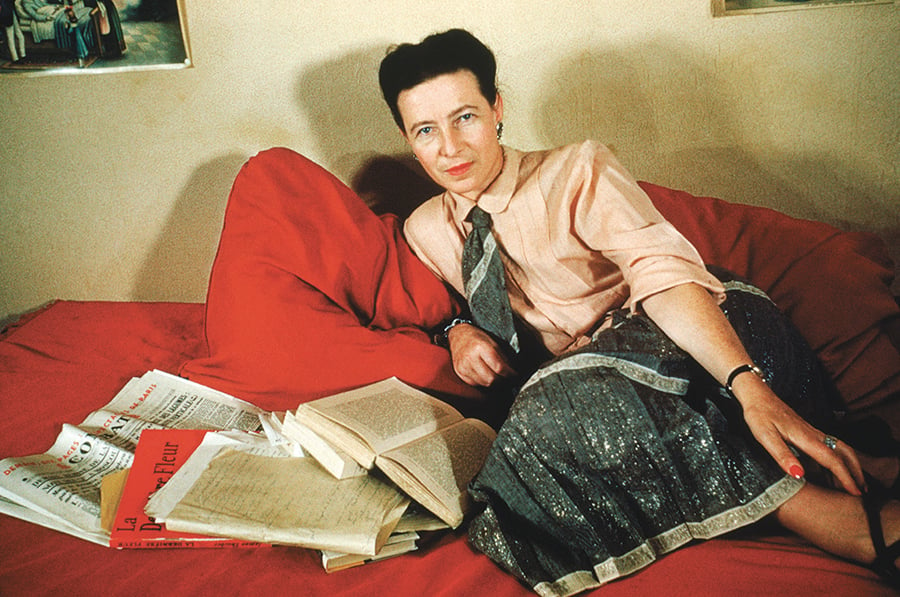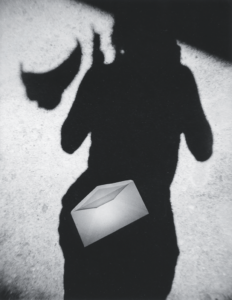
Simone de Beauvoir, 1952 © Gisèle Freund/Photo Researchers History/Getty Images
Simone de Beauvoir, author of The Second Sex (1949), in which she famously asserts that “one is not born, but rather becomes, a woman,” was one of the most important intellectuals in twentieth-century France. Her brilliant writings, her long relationship with the philosopher Jean-Paul Sartre, their cultural significance, and their complex intimate lives make for fascinating study. It is less well known that she also wrote fiction that, in her time, garnered much praise; her 1954 novel The Mandarins won the Prix Goncourt.
Inseparable (Ecco, $26.99) is, in this context, an exciting surprise: a previously unpublished novel written in 1954, immediately after The Mandarins and before her superb autobiography, Memoirs of a Dutiful Daughter (1958). According to Margaret Atwood, who has written a lively and inviting introduction to this slender volume, de Beauvoir “made the mistake of showing it to Sartre . . . [who] could not grasp its significance,” and “dismissed [it] as inconsequential.” De Beauvoir shelved the manuscript, even though its subject—her passionate friendship with Élisabeth Lacoin, known as Zaza, and Zaza’s tragic death at age twenty-one—is one she would address, in various guises, in no less than six literary works.
Beautifully translated by Sandra Smith, Inseparable is torturously delicious and consuming in the way doomed love stories often are. When nine-year-old Sylvie Lepage, “a very good girl,” meets her new classmate Andrée Gallard, she is immediately smitten: Andrée is a little scandalous, funny, a mimic, bursting with secrets about the teachers gleaned from her older sister. Sylvie is fascinated by the rowdy freedoms—or apparent freedoms—of Andrée’s home life, in which passels of siblings and cousins run riot under the benignly neglectful watch of Madame Gallard, Andrée’s mother.
As the girls grow older, the differences between their families become more apparent, and Sylvie’s initial romantic impression of the Gallard household is tempered by a grasp of its strict Catholic faith. “Neither Papa nor the writers I admired were believers,” Sylvie records, and having lost her faith—a sin that could get one expelled from Catholic school—she feels she must “carefully hide [her] fall from grace,” even from Andrée. She also hides the intensity of her feelings for her friend, which she doubts are reciprocated. When Sylvie and Andrée get to the Sorbonne, Andrée is attracted to Sylvie’s study partner, Pascal Blondel, who, Sylvie realizes, in spite of being a man, has had similarly limited options: “He’d been educated in a religious institution where his father was a teacher, and he loved only his studies and his family.”
Although Pascal is as devout as Andrée and her family, the path of their love is far from smooth. Andrée’s mother, so insouciant when her children were small, proves intrusive and controlling, committed to arranged marriages rather than love matches, and determined to keep her daughter occupied with domestic chores. Andrée, a free spirit, grows ever more high-strung and extreme, to the point of self-harm and illness, while Sylvie proves an impotent witness to her friend’s agonized decline. Andrée, like Zaza, suffers an untimely death, one that the novel makes clear is caused by the stifling dictates of the conservative Gallard family and their Catholic faith.
The character of Pascal, we are informed by Sylvie Le Bon de Beauvoir—Simone’s adopted daughter, whose illuminating afterword concludes the volume, along with a brief selection of letters between Simone de Beauvoir and Élisabeth Lacoin—is based on the phenomenologist philosopher Maurice Merleau-Ponty. In its roman à clef aspect, the novel—although decidedly fiction (in her dedication to Zaza, de Beauvoir insists, “this is not truly your story but simply a story inspired by us”)—grants us insight into the preoccupations of France’s future intellectual elite during their interwar university years. The centrality of the struggle between religion and freedom in the late 1920s (de Beauvoir received her B.A. in 1928) and the degree to which adult women were subject to parental strictures may now seem surprising; but, of course, French women did not gain the right to vote until 1944, and married women in France could not open their own bank accounts or have a professional career without their husbands’ permission until as late as 1965.
Brief and exuberant, Inseparable amplifies the canon of a titan of twentieth-century feminism, and reveals her in an unexpectedly tender, unguarded mode. More than that, it’s a touching iteration of the female bildungsroman. De Beauvoir evokes the landscapes, activities, and companions of her adolescence in a vivid and refreshingly unaffected way—bringing Sylvie and Andrée to life, as she hoped to do, “through literary artfulness.”

“Mon Ombre,” by Gladys © The artist. Courtesy the Robin Rice Gallery, New York City
Richard Powers’s new novel Bewilderment (W. W. Norton, $27.95), his first since The Overstory, which won the Pulitzer Prize in 2019, seeks also to convey the intensities of youth, in this case those of an idiosyncratic nine-year-old boy named Robin Byrne. Narrated by Robin’s father, Theo, a widowed astrobiologist, the novel recounts a transformative year in their lives that opens and closes with camping trips in the Great Smoky Mountains. The Byrnes live in Wisconsin, where Theo is a university professor, and Robin—bullied by his peers, often in trouble with his teachers, passionate about animals and nature, and powerfully missing his late mother, Alyssa (an animal rights activist who died in a car accident)—longs to be homeschooled, to be reunited with Alyssa, and to save the planet.
Powers is a writer whose abiding concerns—such as scientific advances in the study of human nature, and the damage humans have done to the natural world—have been articulated in various forms in his twelve previous novels. These concerns have only become more pressing with time. In this case, the Byrnes live in an America reminiscent of the Trump era, in which science-denying politicians are determined to undermine all manner of research. Specifically, they eliminate funding for Theo’s academic project, Earthlike Planet Seeker, which searches for extraterrestrial life:
The country’s ruling party would have opposed the Seeker even if it were free. Finding other Earths was a globalist plot deserving the Tower of Babel treatment. If we academic elites found that life arose all over, it wouldn’t say much for humanity’s Special Relationship with God.
They prove inimical, also, to the work of Martin Currier, a close friend of Alyssa’s who is developing a decoded neurofeedback, or DecNef, program, which involves exposing troubled subjects to the recorded neural activity of others with desirable behaviors or attitudes. In this case, Robin, on the verge of expulsion, is repeatedly exposed to a recording Currier made of his late mother’s experience of ecstasy.
The results are astonishing, and Robin transforms from a struggling, depressive, and too often rageful child into a youth of prodigious wisdom and articulacy. For Theo, who has passionately resisted drug therapy for his son, the experience is ambivalent:
Decoded Neurofeedback was changing him, as surely as Ritalin would have. But then, everything on Earth was changing him . . . there was no “Robin,” no one pilgrim in this procession of selves for him ever to remain the same as. The whole kaleidoscopic pageant of them, parading through time and space, was itself a work in progress.
Infused with Alyssa’s spirit, and apparently with some of her knowledge, Robin is inspired by a Greta Thunberg–like character named Inga Alder to become an activist. The boy’s move into the public arena comes just as Currier’s DecNef starts to attract media attention—both in print and on television. Although Robin’s identity is supposedly obscured, it’s not long before curious journalists track down the family. Eventually, the exposure leads to problems for Currier and his experiments; and from there, the rest of the story unfolds with an inevitability that is either pleasing or dismaying, depending on your feelings about plot.
In a moving note that precedes the novel, Powers explains the importance in his own youth of reading “Flowers for Algernon,” Daniel Keyes’s short story about a man who has surgery to enhance his intelligence, only for its effects to prove temporary. He explains that the plot returned to him when he first heard about decoded neurofeedback and imagined its potential consequences. This, combined with a growing appreciation of the profound effects of the Anthropocene on young people’s psyches, led him to write Bewilderment. There are echoes, too, of The Little Prince, in chapters about diverse inhabited planets that Theo and Robin imagine visiting.
Bewilderment feels, in certain respects, too familiar and tidy. Once the stakes are clear, the plot is obvious, and its mechanisms will be recognizable, along with the book’s themes, to readers of earlier Powers novels (see, for example, Generosity: An Enhancement). Characterization is not Powers’s forte. Though central to the narrative, Alyssa is a cipher whose flatness is rendered plausible only by Theo’s limited point of view. Moreover, the sketch of Theo’s personal and family history feels as thin as paper. But if Theo’s other relationships remain one-dimensional, the connection between father and son has greater density and texture, as does Robin’s urgent and unbridled passion for the natural world. Unabashedly issue-driven, Bewilderment may neither challenge nor surprise, but admirers of Powers’s ability to fold near-futuristic scientific facts into a meticulously constructed plot will nonetheless find satisfaction.

“Showy Orchids, Jungle Trail, Cherokee Orchard, Great Smoky Mountains National Park, Tennessee, April 26, 1968,” by Eliot Porter © Amon Carter Museum of American Art, Fort Worth, Texas, P1990.51.4697.2. Bequest of the artist
Challenge and surprise are, on the other hand, essential to the Danish writer Harald Voetmann’s pungent short novel Awake (New Directions, $14.95). Ably translated by Johanne Sorgenfri Ottosen, the book chronicles the late days of Pliny the Elder, the prolific writer, historian, and naturalist perhaps best known for having died while attempting to rescue friends from Mount Vesuvius in 79 ad. Voetmann is not so crass, however, as to center his narrative upon this familiar and terminal detail, which emerges only through an account by his nephew, Pliny the Younger, son of his sister Plinia, and himself an author and magistrate. Rather, the book is chiefly composed, like a play, of nine scenes involving Pliny, his slave Diocles, and said nephew. Within each scene, vignettes are structured around quotations from Pliny’s Naturalis Historia, his attempt at an encyclopedia of all knowledge. Taking these citations as inspiration, Voetmann—himself a translator of Latin texts, including works by Petronius and Juvenal—conjures incidents and meditations chiefly, though not exclusively, from Pliny’s perspective. Both the phlegmatic Pliny the Younger and the priapic and ill-fated Diocles also have their say.
Pliny the Elder relates, for example, a stroll through the Gardens of Sallust in childhood:
My mother bought me a little donkey made of red clay. The donkey dangled on a leather strap, it was meant as a necklace. My mother tightened the strap so that I might wear it around my wrist instead where it wouldn’t eclipse the golden orb on my chest that marked my class. The trinket seller’s skin was dark and blotchy from exposure to sun and dust. His accent was Greek, his copper hoops were green with verdigris.
In these few sentences, the concrete world of the first century ad is rendered present and particular—as when I once saw, in a museum, a tiny bronze lantern in the shape of a monkey, sold as a souvenir at the gladiatorial games in Pompeii the way Red Sox T-shirts are now sold at Fenway Park.
But the vast differences from our contemporary times are as sharply conveyed, whether in the image of the wax baby dolls fashioned by Pliny’s nurse to represent his dead siblings; or the strange and awful description of Pliny’s paid sexual encounter with a young woman without orifices; or, horrendously, the crucifixion of a runaway slave:
Overripe figs fall as Echion hammers, one of the freedmen lets out an accidental chuckle as a moldy fig bursts between the wisps of red on Echion’s scalp. Echion raises his bloodstained face at him and bares his teeth.
And that’s not the half of it.
Pliny the Elder—his breathing impaired, his nose frequently bleeding, his body immense and deliquescent—is revolting. The world he inhabits is bawdy and casually brutal. Women, children, and slaves are playthings for their masters; lust is as freely licensed as hunger; the body’s effluvia are frankly examined. And yet the brilliant meditations—on whether color exists in the world or in the eye, on physiognomy, on borders and borderlessness, and on suffering—seem in some instances comically obsolete and in others utterly germane. Pliny’s ambition to capture the world, all of it, at the sacrifice of sleep, rings as true today as it must have two thousand years ago.
To ask whether Awake is in any traditional sense a novel seems irrelevant, just as it’s irrelevant to quibble over Anne Carson’s forms. This short book is neither pleasing, nor in any straightforward way satisfying; in places, it is wildly unpleasant. But strange as it is, Awake is original, piercing, and richly exhilarating. Voetmann’s text is a sharp reminder of how powerfully and succinctly well-chosen words can create a world, render experiences, and express thoughts—in short, transport us, to places and in ways we could not have imagined.






































































































